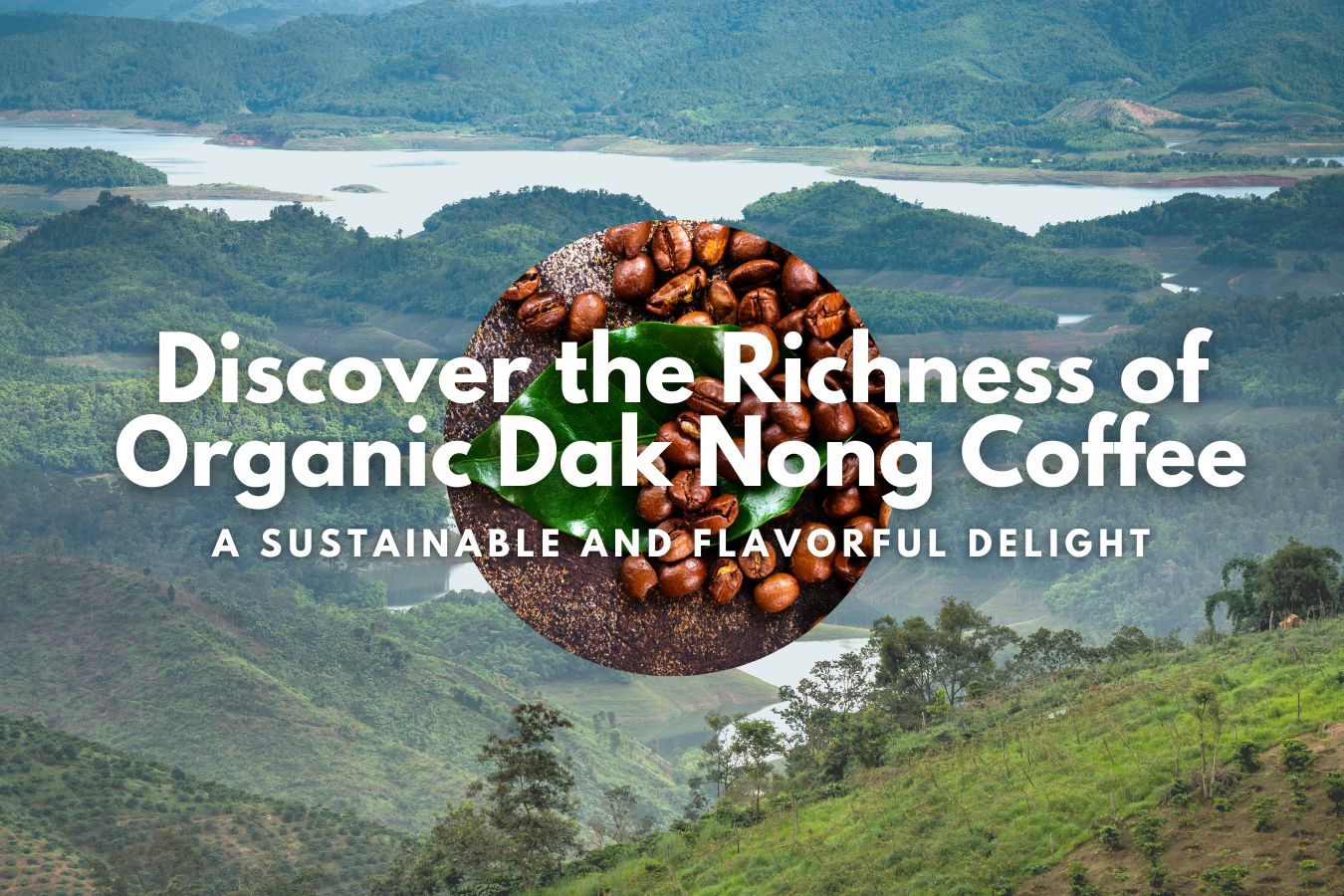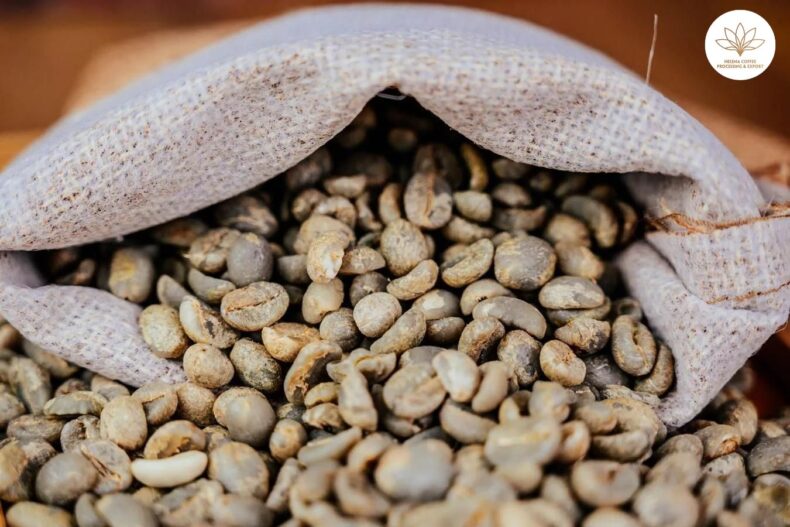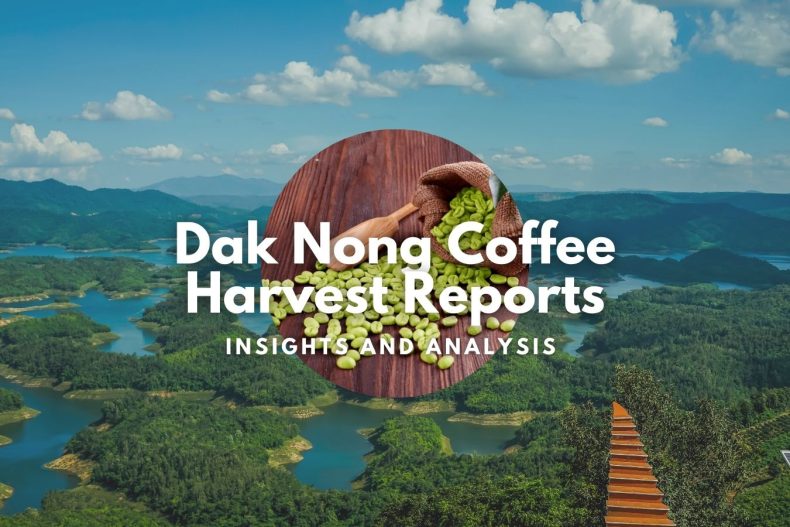
When it comes to enjoying a cup of coffee, many people are becoming increasingly conscious of the quality and origin of their brew. One particular variety that has gained popularity in recent years is Organic Dak Nong Coffee.
In this article, we will explore the unique characteristics of this organic coffee, its production process, its benefits, and where you can find it. So grab your favorite mug, sit back, and let’s delve into the world of Organic Dak Nong Coffee.
What is Organic Dak Nong Coffee?
Organic coffee is grown according to organic methods. Coffee trees are grown on clean soil, free of pesticides, synthetic fertilizers, and chemicals. Coffee trees are grown most naturally. People only use manual measures to care for, process, and use microbial fertilizers to fertilize the tree.
Initially, organic coffee only appeared in poor lands and households that could not afford fertilizer. At that time, those coffee products were also quite poorly developed, and the quality of the beans was also inferior. However, when the concept of organic coffee is more developed, the care technique is also better, so the quality of coffee beans when harvested is greatly improved.
Organic Dak Nong Coffee refers to coffee beans grown and produced using organic farming methods in the Dak Nong region of Vietnam. These beans are cultivated without synthetic fertilizers, pesticides, or genetically modified organisms (GMOs). Instead, organic farmers employ natural techniques that prioritize soil health, biodiversity, and environmental sustainability.
The Benefits of Organic Dak Nong Coffee
- High-quality flavor: Organic Dak Nong Coffee is known for its exceptional taste and aroma. The organic farming practices in its products help preserve the coffee beans’ natural flavors, resulting in a rich and well-rounded cup of coffee.
- Environmental sustainability: By opting for organic coffee, you support farming practices prioritizing the ecosystem’s health. Organic farmers avoid using harmful chemicals, which helps protect the soil, water sources, and local wildlife.
- Health benefits: Choosing organic coffee means avoiding exposure to potentially harmful chemicals commonly found in conventionally grown coffee beans. Organic Dak Nong Coffee is free from synthetic pesticides and fertilizers, making it a healthier choice for coffee enthusiasts.
- Supporting local communities: By purchasing Organic Dak Nong Coffee, you directly support local farmers and their communities. Organic farming practices often involve fair trade principles, ensuring farmers receive a reasonable price for their hard work and dedication.
How is Organic Dak Nong Coffee Produced?
The production process of Organic Dak Nong Coffee involves several key steps:
- Selection of coffee varieties: Organic farmers in the Dak Nong region carefully select coffee plant varieties well-suited to the local climate and growing conditions. This ensures optimal growth and flavor development.
- Soil preparation: Before planting, the soil is prepared using organic fertilizers, compost, and natural amendments. This enhances the soil’s fertility and provides the coffee plants with essential nutrients.
- Planting and cultivation: Organic coffee plants are planted in carefully spaced rows for optimal sunlight exposure and airflow. Weeds are controlled through manual methods and natural weed suppressants, minimizing herbicide needs.
- Harvesting: Once the coffee cherries have ripened, they are handpicked by skilled farmers. This selective harvesting ensures that only the ripest cherries are chosen, producing higher-quality beans.
- Processing and roasting: The harvested coffee cherries undergo a thorough processing phase, which includes washing, drying, and hulling.
The Importance of Sustainable Farming Practices
One key aspect that separates Organic Dak Nong Coffee is its commitment to sustainable farming practices. Organic farmers in the Dak Nong region prioritize environmental stewardship and the long-term health of their land. By avoiding synthetic chemicals and genetically modified organisms, they contribute to preserving biodiversity and the overall balance of the ecosystem.
Sustainable farming practices employed in the cultivation of Organic Dak Nong Coffee include:
- Composting: Organic farmers utilize natural materials such as coffee pulp, leaves, and other organic matter. This enriches the soil with essential nutrients, improves its structure, and promotes the growth of beneficial microorganisms.
- Natural pest control: Organic farmers implement integrated pest management techniques instead of relying on chemical pesticides. This involves attracting beneficial insects, using natural repellents, and practicing crop rotation to minimize pest infestations.
- Water conservation: Organic coffee farms prioritize water conservation by implementing efficient irrigation systems and mulching techniques. Reducing water usage and minimizing runoff help preserve local water sources and protect the surrounding ecosystem.
- Shade-grown coffee: Many organic coffee farms embrace shade-grown cultivation methods. Allowing coffee plants to grow under the canopy of taller trees provides a habitat for diverse bird species and promotes ecological balance.
Understanding the Certification Process for Organic Coffee
To ensure the integrity and authenticity of Organic Dak Nong Coffee, rigorous certification processes are in place. Certification organizations, such as the USDA (United States Department of Agriculture) and ECOCERT, evaluate coffee farms and their adherence to organic standards. These standards encompass various aspects, including farming practices, handling, and processing methods.
To earn the organic certification, coffee farms must meet specific criteria, such as:
- Absence of synthetic chemicals: Coffee farms seeking organic certification must refrain from using synthetic pesticides, herbicides, and fertilizers. Instead, they rely on natural alternatives and sustainable farming techniques.
- Buffer zones: Organic coffee farms must establish buffer zones to prevent contamination from neighboring non-organic farms. This ensures that the coffee beans are not exposed to chemicals or GMOs.
- Traceability and documentation: Certified organic coffee farms maintain detailed records of their farming practices, including inputs used, harvesting methods, and processing techniques. This traceability allows for transparency and accountability throughout the supply chain.
Exploring the Flavor Profile of Organic Dak Nong Coffee
Organic Dak Nong Coffee offers a delightful flavor profile that captivates coffee enthusiasts. The organic farming methods employed in its production contribute to the distinct taste and aroma. Here are some characteristics commonly associated with Organic Dak Nong Coffee:
- Rich and smooth: The coffee beans from the Dak Nong region tend to produce a cup of coffee that is rich, smooth, and well-balanced. The flavors are often described as deep and velvety, with hints of chocolate, caramel, and nuts.
- Bright acidity: Organic Dak Nong Coffee often exhibits a bright and lively acidity, adding a refreshing and vibrant aspect to the overall taste. This acidity enhances the complexity of the coffee and creates a pleasant sensory experience.
- Clean finish: The accurate processing and roasting techniques for Organic Dak Nong Coffee result in a clean and lingering finish. This means the flavors don’t stay on the palate, allowing for a refreshing aftertaste.
Tips for Brewing the Perfect Cup of Organic Dak Nong Coffee
To fully savor Organic Dak Nong Coffee’s exquisite flavors, brewing it with care is essential. Here are some tips to help you achieve the perfect cup:
- Freshly roasted beans: Start with high-quality, freshly roasted Organic Dak Nong Coffee beans. Opt for whole beans and grind them before brewing to preserve their freshness and aroma.
- Proper water-to-coffee ratio: Use a kitchen scale to measure the precise amount of coffee grounds and water for your desired brew. The general guideline is a ratio of 1:16, which means 1 gram of coffee per 16 grams of water. Adjust the balance according to your preference for a firmer or milder cup.
- Water temperature: The ideal water temperature for brewing Organic Dak Nong Coffee is between 195°F (90°C) and 205°F (96°C). Avoid using boiling water, as it can scorch the coffee and result in a bitter taste. Invest in a good quality kettle with temperature control, or allow boiled water to cool for a minute before brewing.
- Brewing methods: There are various brewing methods, such as pour-over, French press, or espresso machine. Experiment with different techniques to find the one that suits your taste preferences. Each plan can highlight various flavor aspects of Organic Dak Nong Coffee.
- Time and extraction: The brewing time and extraction process can significantly impact the taste of your coffee. Follow the recommended brewing time for your chosen method, usually between 3 to 4 minutes. Over-extraction can lead to a bitter taste, while under-extraction can result in a weak and underwhelming cup.
- Storage: To maintain the freshness of your Organic Dak Nong Coffee, store it in an airtight container away from direct sunlight, heat, and moisture. Avoid refrigeration, as the coffee can absorb odors from other food items. Use the coffee within two to three weeks of roasting for the best flavor.
Following these tips, you can brew a cup of Organic Dak Nong Coffee that showcases its unique flavors and aromas.
Conclusion
Organic Dak Nong Coffee offers a unique and satisfying coffee experience. Its commitment to organic farming ensures a high-quality product that is delicious and environmentally sustainable. By choosing Organic Dak Nong Coffee, you support local farmers and communities while enjoying its rich and smooth flavors.
From the careful selection of coffee varieties to the meticulous harvesting and processing methods, Organic Dak Nong Coffee showcases the dedication and craftsmanship of the farmers in the Dak Nong region. The result is a cup of coffee that is not only flavorful but also carries the essence of sustainable and ethical practices.
Frequently Asked Questions (FAQs)
- Is Organic Dak Nong Coffee more expensive than conventional coffee? Yes, organic coffee, including Organic Dak Nong Coffee, may be slightly higher due to the additional costs associated with organic farming practices and certification. However, the premium justifies the superior taste, quality, and environmental benefits.
- Can Organic Dak Nong Coffee be used for espresso? Absolutely! Organic Dak Nong Coffee is suitable for making espresso. Its well-rounded flavor and smoothness make it perfect for espresso-based drinks like lattes, cappuccinos, and Americanos.
- Is Organic Dak Nong Coffee suitable for all brewing methods? Yes, Organic Dak Nong Coffee can be enjoyed using various brewing methods, including pour-over, French press, drip coffee maker, and espresso machines. Its unique flavor profile shines through regardless of the brewing method you choose.


